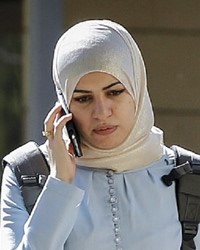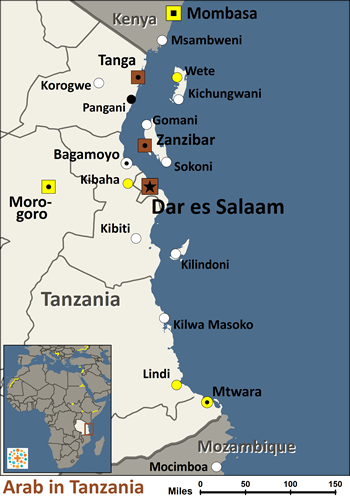The Arabs are one of the largest and fastest growing ethnic groups in the world. Throughout Africa, Arabs are subdivided into thousands of ethnic groups and subgroups. These classifications are based primarily on geographical location, variations in their Islamic beliefs, and the Arabic dialect they speak.
The (Coastal) Arabs live along the coasts of Tanzania and Kenya, East Africa, in an area commonly known as the Coastal Belt. Those in Kenya usually originated in Oman and Yemen. They are concentrated in some of the ancient settlements along the coast and in cities such as Dar es Salaam. These Arabs speak Arabiya, or Coast Arabic, which is an Arabic dialect. They also speak the regional language, Swahili.
The Coastal Arabs refer to their ancestors as the "old" or "true" Arabs. Though their culture is still very similar to that of the first Arabs (desert nomads or Bedouins), their traditions have died down to some extent. They interact with other Muslim communities but have their own culture and even their own cuisine.
Most of the Arabs in Tanzania live in rural villages. They are primarily farmers and fishermen, although some who live in the cities may have other professions. The farmers grow cereal grains, vegetables, cotton, and raise livestock. Others have special skills as carpenters, barbers, or religious leaders; a few have become teachers or doctors. Those who are best known in this region are the merchants. The nature of Arab villages in Tanzania reflects the closeness of the families. The homes typically have dirt floors and are built with local products, generally mud brick. Family honor is very important, and each family member has a defined role according to Arab tradition. The family unit provides security during times of economic hardship and in old age. When young people leave their villages to find jobs in the towns or cities, the family socio-economic system is often weakened.
Children are considered a great asset to the villages, since they are the future work force. They also provide social security for their parents and grandparents. The birth of children, especially boys, is cause for great celebration among the Arabs. As soon as a baby is born, the name "Allah" is whispered in its ear so that this will be the first word the child hears.
Boys and girls are raised together during early childhood; however, they receive very different treatment. Boys are shown much affection and are pampered by their mothers, while girls, though shown affection, are not pampered. The father is a stern disciplinarian to both his sons and daughters. At a very early age, boys are taken to the fields with their fathers and older brothers to help with the farming. The young boys are also taught to obey and respect older males. Girls stay at home to help their mothers cook and care for the younger children.
Among the Arabs, marriages take place as a way to continue a family lineage or as a means of meeting a family's needs. Since marriage is viewed as the union of two families rather than the union of two people, couples work hard to make their marriages successful. As a result, divorce is very rare. Arabs tend to marry other Arabs, because they are proud of their heritage and desire to remain a closed group. Although polygyny (having multiple wives) is accepted by Muslim Arabs, it is generally practiced by only the wealthier men whose first wives are barren, or those who desire to establish new family ties.
Arabs in Tanzania are mostly Muslim, though there are some traditional Christians among them. Many follow the teachings of the Koran because they believe it provides hope for a better life after death. Like other Muslims, Arabs in Tanzania adhere to the five "pillars" of Islam. These include reciting prayers five times a day while facing Mecca, affirming that Allah is the only god and Mohammed is his prophet, observing the prescribed fasts, giving alms to the poor, and making at least one pilgrimage to Mecca.
The mosque is the center of Islamic worship. Men regularly attend the mosque for prayer services, but women rarely attend. While men worship at the mosques, women usually attend ceremonies conducted at home by female religious leaders.
In addition to their Islamic beliefs, some of the Arabs in Tanzania also believe in spirits. They try to appease these spirits during times of crisis or sickness. Magic is also practiced by many of them.
Because of their strong adherence to Islam, Arabs in Tanzania have been reluctant to accept any idea that might steer them towards Christ as Savior. They need the JESUS Film and radio broadcasts to be widely available.
Pray for the Lord to thrust out workers to the Arabs in Tanzania.
Pray for Arab persons of peace to welcome Christ's ambassadors.
Pray for Arabs in Tanzania to understand they can never gain God's favor apart from the finished work of Jesus Christ.
Pray for a movement to Christ among the Arabs of Tanzania.
Scripture Prayers for the Arab in Tanzania.
| Profile Source: Joshua Project |





























